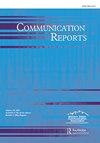When Wearing a Mask Is (Not) the Norm: Political Partisanship and Persuasion in the Context of COVID-19
IF 1.6
Q3 COMMUNICATION
引用次数: 1
Abstract
This study examined the effects of source partisanship and credentials on persuasion. Democrats and Republicans (N = 206) read a policy statement advocating for a national mask mandate, ostensibly written by either a doctor or layperson, associated either with the Democratic or Republican party. Participants’ perceptions of the source and receptivity to the message aligned with their political party’s normative position on the issue: Democrats rated the source as more competent and trustworthy, engaged in less counterarguing, and supported the policy more than Republicans. Although the doctor was trusted more than the layperson and Republicans (but not Democrats) attributed more trust and competence to an ingroup than an outgroup source, source characteristics had no effect on message receptivity.当戴口罩是(不是)规范:新冠肺炎背景下的政治党派和说服
这项研究考察了来源党派和资历对说服力的影响。民主党人和共和党人(N=206)宣读了一份政策声明,主张全国口罩强制令,该声明表面上由医生或非专业人士撰写,与民主党或共和党有关联。参与者对消息来源的看法和对信息的接受程度与他们所在政党在这个问题上的规范立场一致:民主党人认为消息来源更有能力、更值得信赖,参与的反驳更少,并且比共和党人更支持这项政策。尽管医生比普通人更受信任,共和党人(但不是民主党人)将更多的信任和能力归因于内部群体而不是外部群体,但来源特征对信息接受性没有影响。
本文章由计算机程序翻译,如有差异,请以英文原文为准。
求助全文
约1分钟内获得全文
求助全文
来源期刊

Communication Reports
COMMUNICATION-
CiteScore
3.70
自引率
0.00%
发文量
18
期刊介绍:
Communication Reports (CR), published biannually since 1988, is one of two scholarly journals of the Western States Communication Association (WSCA). The journal publishes original manuscripts that are short, data/text-based, and related to the broadly defined field of human communication. The mission of the journal is to showcase exemplary scholarship without censorship based on topics, methods, or analytical tools. Articles that are purely speculative or theoretical, and not data analytic, are not appropriate for this journal. Authors are expected to devote a substantial portion of the manuscript to analyzing and reporting research data.
 求助内容:
求助内容: 应助结果提醒方式:
应助结果提醒方式:


